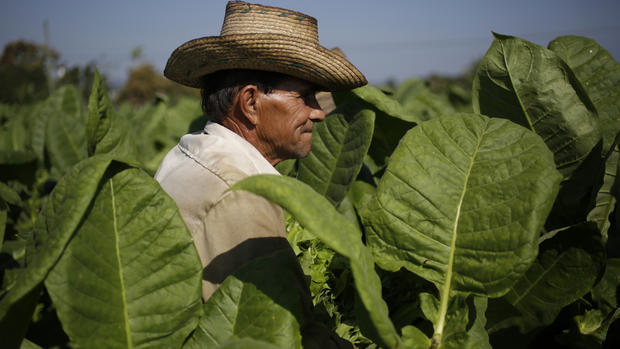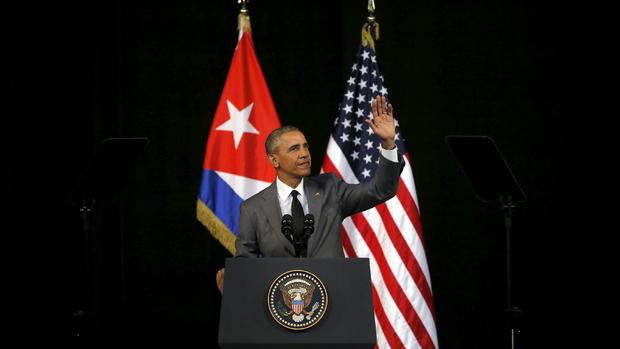Cubans fleeing to U.S. in high numbers despite thaw in relations
WASHINGTON, D.C. -- The thaw in relations between the United States and Cuba is raising concerns among some on the communist-ruled island nation that the U.S. could wipe away a special immigration policy that favors Cubans.
Those fears are largely unfounded. But that hasn't stopped tens of thousands of Cubans from fleeing their home since President Barack Obama announced the normalization of relations between the countries in 2014.
In fact, the rush out of Cuba has led to the highest number of people trying to make the dangerous sea crossing in the past eight years. That's according to internal documents from the Homeland Security Department that were obtained by The Associated Press.
"The perception is that the time is now. Given all that is going on, I could see how that perception would exist," said Coast Guard Capt. Mark Gordon.
The rapprochement between the Cold War foes could have benefits for people in each country. But Cubans worry that once U.S. tourists and businesses flock to Havana, American politicians will move to end an immigration policy that basically allows any Cuban who can make it to U.S. soil to stay.
Cubans can get permanent resident status after living in the U.S. for a year and can later become a citizen as part of the decades-old Cuban Adjustment Act. No other immigrant community is afforded the same on-arrival treatment. Most foreigners trying to come to the United States without a visa try to cross the Mexican border illegally, and typically are arrested and face deportation.
The special treatment for Cubans has long been a draw, but attempts to get to the U.S. by sea have recently reached worrisome levels.
During the 2015 budget year, more than 4,400 Cubans set out for the U.S. by sea, a 20 percent increase over the previous year, according to Coast Guard figures. The agency has had to step up its presence in the Florida Straits to deal with more people on overcrowded, makeshift rafts or barely seaworthy boats. Between October 2015 and this March, more than 4,300 people tried to make the dangerous trip.
Would-be immigrants caught at sea are returned to Cuba, so the rush has made people more desperate, with some actually wounding themselves with knives or guns in the hopes they will be taken to a hospital in the U.S. instead of sent back. Others try to flee rescuers and refuse life jackets.
More than 25,800 other people have also arrived at ports of entry, the bulk of them crossing the border in Laredo, Texas.
Lourdes Mesias, who leads the refugee program for Lutheran Services Florida, said newly arriving immigrants have described harrowing trips, both at sea and over land through Latin America and into Mexico.
"As Cubans we don't see any changes on the horizon," said Mesias, who came to the United States from Cuba 17 years ago.
Instead, she said, the economic conditions on the island "are worse and worse every day" and human rights have yet to improve.
"That's the reason why they are putting themselves in those very high risk situations," Mesias said. "They are trying for hope. For something better."
Though migration has been a topic of discussion between the two countries, changes to U.S. immigration laws have not been formally proposed by either government.
Since October 2014, U.S. Customs and Border Protection has processed nearly 75,000 Cubans who arrived at ports of entry, many of them in Laredo. During the same period, more than 131,800 families and unaccompanied children, mostly from Central America, have been apprehended at the border in the Rio Grande Valley. The Cubans were allowed into the United States while the families and children were almost all ordered to appear in immigration court.
Rep. Henry Cuellar, D-Texas, said "there's just something unfair" about the special treatment of Cubans.
Cuellar and Rep. Blake Farenthold, R-Texas, have introduced legislation to end the preferential treatment. Cuellar said he doesn't expect the bill to pass ahead of the presidential election in November, but said the issue needs to be addressed.
"I don't want to take anything from Cubans, but it's a matter of a sense of fair play and how we treat each other," Cuellar said.
Republicans, including GOP presidential candidate Sen. Ted Cruz, have balked at making any changes to the U.S. relationship with Cuba.
Meanwhile, Cuban revolutionary leader Fidel Castro delivered a valedictory speech Tuesday to the Communist Party that he put in power a half-century ago, telling party members he is nearing the end of his life and exhorting them to help his ideas survive.
"I'll be 90 years old soon," Castro said in his most extensive public appearance in years. "Soon I'll be like all the others. The time will come for all of us, but the ideas of the Cuban Communists will remain as proof on this planet that if they are worked at with fervor and dignity, they can produce the material and cultural goods that human beings need, and we need to fight without a truce to obtain them."
CBS News reported on Saturday that Cuba's Communist Party meeting may be the last with revolutionary leaders.
Castro spoke as the government announced that his brother Raul will retain the Cuban Communist Party's highest post alongside his hardline second-in-command. That announcement and Fidel Castro's speech together delivered a resounding message that the island's revolutionary generation will remain in control even as its members age and die, relations with the U.S. are normalized, and popular dissatisfaction grows over the country's economic performance.
There is no foreign press access to the event that brought together 1,000 delegates and 280 invited guests, according to the party's daily newspaper Granma.
Party congresses are supposed to be held every five years. The last congress, in 2011, was preceded by an extensive nationwide debate on the guidelines for Cuba's economic and social development as it seeks a new form of socialism that will pull the Cuban economy out of the doldrums and resolve critical social issues such as a housing shortage, inadequate pay, faltering production and lack of cash for investments in crucial economic sectors, CBS News reported.
Fifty-five years after Fidel Castro declared that Cuba's revolution was socialist and began installing a single-party system and centrally planned economy, the Cuban government is battling a deep crisis of credibility.
With no memory of the revolution's heady first decades, younger Cubans complain bitterly about low state salaries of about $25 a month that leave them struggling to afford food and other staple goods. Cuba's creaky state-run media and cultural institutions compete with flashy foreign programming shared online and on memory drives passed hand-to-hand. Emigration to the United States and other countries has soared to one of its highest points since the revolution.
Limited openings to private enterprise have stalled, and the government describes capitalism as a threat even as it appears unable to increase productivity in Cuba's inefficient, theft-plagued networks of state-run enterprises.

